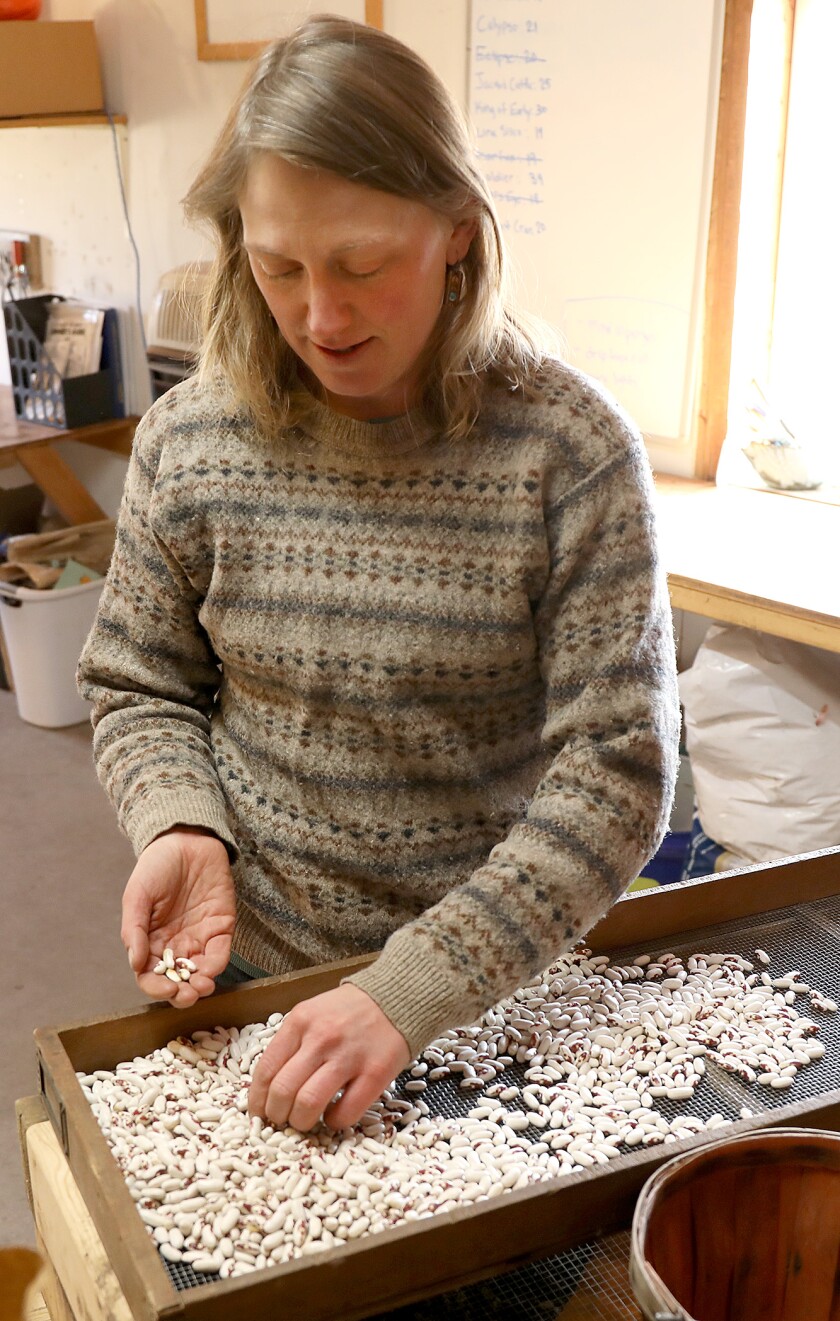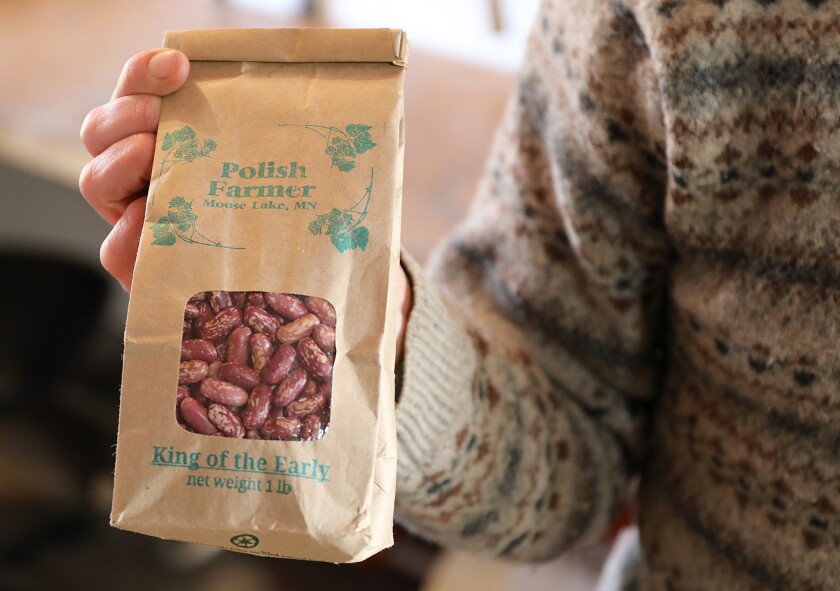Britt Johnson sorts a mound of shiny, white beans speckled with burgundy, as they lightly rattle against a metal screen. Bit by bit, she discards any that are chipped, discolored or shriveled.
“Oh I missed one. Farmer bean,” Johnson says, grabbing the tiny legume with her thumb and forefinger.
Larger farms have technology that does this; Johnson does it by hand.

ADVERTISEMENT
She’s behind Polish Farmer , Moose Lake’s one-woman heirloom dry-bean and produce operation. It’s Johnson’s second year on her 40 acres, and she’s one of the two newer bean farms in the area. (The second is Four Beans Farm in Superior, which also opened in 2020.)
“COVID has shown that supply chains don’t always work out. As a society, we’re realizing we should stick close to home when it’s something as important as our food,” Johnson said.
Also: “I like being able to provide something that consumers won’t be able to find,” she added.
You grow up thinking there’s limited types of bean — pinto, kidney, black — but many have more flavor and a lot of characteristics that aren’t sought after in large-scale agriculture because they don’t hold well or they don’t have as high of yield, Johnson said.
She chooses hers based on their natural beauty and flavor.

In Johnson’s shop sat bags of Jacob’s Cattle, a bean with lively maroon with white splotches; and Dalmation-like Calypso, with black and white spots.
ADVERTISEMENT
Arikara, Marfax and Tiger’s Eye are also among the 10 varieties Johnson grows, and while it’s limited in northern Minnesota, that’s the tip of the iceberg, she said.
Some varieties she grows can be traced to indigenous tribes in North America and South America. Farmers are fortunate to be able to grow these beans that other generations have taken the time to preserve, she said.
RELATED
- Pandemic propels Duluth woman into urban farming
- Former landless farmer plants Barnum roots
- Hermantown farmer-artists embrace their small roots on 6-acre plot
Johnson graduated from college with an elementary education degree. She then signed up to teach English abroad, and moved to Kazakhstan for six months.
“Everyone around me has a garden, everyone around was raising an animal for their meat, and I brought that home and started a garden in my mom’s yard,” she recalled.
She then began farming internships in southern Alaska and Wisconsin before eventually working at Food Farm and Stone’s Throw Farm in Wrenshall. Originally from St. Paul, she lived in Duluth for five years before buying her Moose Lake farmstead.

ADVERTISEMENT
Catherine Conover, co-owner of Stone’s Throw, connected her community-supported agriculture members to Polish Farmer for beans.
Johnson has been working Conover’s land for five years, and she is her only employee during the season. “The first few times she worked for me, I realized she was going to be faster than me at just about everything, and I was OK with that,” Conover recalled. “She’s a really dedicated hard-working person … I’m super proud of her.”

Conover connected Mary Dragich to Johnson’s farm.
Dragich of Duluth prefers to support local farmers; the practices are more sustainable and “I love keeping money in the community,” supporting the folks doing the work, knowing who they are and how the food is grown, she said.
Dragich has grown beans in her own garden, and it was a trying task. The work you put in for 2 cups of beans is a lot, and it doesn’t go very far. “To have 7 pounds of beans from Britt is ‘wow,’” Dragich said, adding: “It’s great we have this opportunity to buy a protein source from somebody down the road.”
ADVERTISEMENT

The name of her operation is an homage to her family’s agricultural history.
Her mother’s family emigrated from Poland to Minnesota in 1881. “A lot of people relate to farming in their history,” she said.
Johnson’s Moose Lake homestead is a former ’70s small-scale dairy operation that saw more cattle and hay than vegetables.
She shares the shop with her partner, and there are bits of in-progress woodwork about, intended for the farmstead, along with beekeeper suits for their so-far single hive.
Her plots are surrounded by an electric fence, and she has plans to update her irrigation system.
Johnson has cultivated about an acre and a half, and plans to continue building up the soil.
ADVERTISEMENT

Beans themselves are pretty light on the soil, she said. They fix their own nitrogen. They’re not very heavy feeders, and they don’t have to be fertilized much.
Bean farming is a bit different than farming veggies.
What seeds aren’t saved from the previous year, Johnson gets from Iowa or Vermont. They’re planted in June. Come September when the plants are brown and a bit dried out, she can begin harvesting; they won’t be ready to sell until October.
After pulling them out by hand, the bean plants dry for a couple of days in a pile. Johnson then throws bundle after bundle into her modified wood chipper, which threshes and separates the seeds.
She winnows the plants by putting them through a large screen and dropping them into buckets in front of a boxed fan for additional drying. Then the sorting, and more sorting, to remove the split, discolored beans to prepare them for market.
The drought didn’t affect her crop as much as the wet September, which led to her covering and moving her beans inside and out to allow for ample dry time. “If I let them sit too long with moisture, they’ll split in the wood chipper,” she said.
Johnson harvested about 500 pounds this year.
ADVERTISEMENT
“Farming is a personal challenge. Anything’s possible, it’s just a matter of how much energy and time you can put into it. Can you keep going for that other hour, even in that rainy, soggy, weather. What can keep you going and motivated.
“The end product is what does.”
On Our Farm is a profile of Northland farms and the people behind them. If you have one to recommend, email Melinda Lavine at mlavine@duluthnews.com or call 218-723-5346.

Find the Polish Farmer
If you go
Britt Johnson will be tabling at this upcoming event.
What: Neighbor-Made Local Art and Gift Fair
When: 10 a.m. to 3 p.m., Saturday, Dec. 11
Where: Peace United Church of Christ, 1111 N. 11th Ave, E.
Cost: Free










